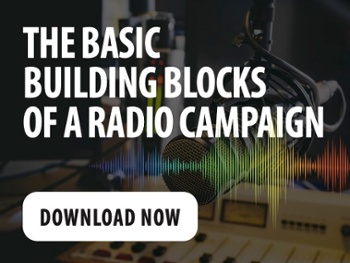Missouri Marketing Resource Blog
.jpg)
Why Radio is King
.jpg?width=600&name=Untitled%20design%20(12).jpg)
According to Nielsen, 92% of Americans listen to radio every week. Compare that to the number who consume television on a weekly basis; surprisingly, just 87%. Podcasts bring up the distant rear with a mere 22%.
Across all demographics, radio is the most popular form of media in America. For adults ranging in age from 18 and up, radio reaches between 90 and 94% of them all. But why is radio king? How has it enjoyed such an enduring reign? Here are some likely reasons:
Radio is Local (and immediate)
Radio broadcasts provide real-time information, and some that broadcast 24 hours a day can provide the most recent updates to listeners. The medium tends to produce the fastest response time: a man with a microphone and a radio tower is a lot easier to mobilize than a TV crew or even a web article. And when access to the mobile network is down as a result of an overload, or phone lines are cut, radio has proven its worth time and again. Even without electricity, most radio sets can be battery operated (some can even be hand-cranked).
Beyond local emergency announcements and communications during disasters, radio also provides an outlet for regular community messaging and activities such as local sports, community events, special events, and local business advertising.
Radio is Portable
Radio has been “the” audio medium audiences are used to since the 20s – and though we don’t crowd around it in our living rooms to hear the “Little Orphan Annie Show” anymore, most Americans listen to radio in cars and at work. Almost every car made from 1950 onward includes a radio. It’s a great travel buddy and the most convenient form of entertainment on a long drive, or while working, doing chores, or having a yard party.
Radio is Advertiser Friendly
Most TV viewers have moved over to subscription based services so they don’t have their programming interrupted by commercials – but radio allows advertisers to reach large audiences - AND targets them when they’re out and closest to retailers! The average listener may not consider that a plus, but advertiser-funded mediums tend to be FREE, which leads to the next point…
Radio is Free
Radio doesn't require any form of monthly subscription, unlike an ever-growing number of current media services that do. Even podcasts are often on subscription sites, making radio a free alternative when most other services are becoming increasingly costly.
Radio is Adaptable
Radio adapts with changing technologies and consumer trends. Radio is now accessible through laptops, computers, phones and even smart speakers, so you can listen to your favorite station whenever you want, however you want.
Radio doesn’t require you to set time aside the way TV does. TV requires the full attention of its audience due to audio and visual elements… but radio is one of the most passive forms of entertainment in existence; you can tune in anytime, anywhere without missing out on half of the experience (unless you happen to turn it on right towards the end of a song you really like!).
Radio is Inclusive
Radio has a diverse variety of stations able to appeal to all audience tastes, whereas other mediums – particularly podcasts – aim for limited audiences, covering niche topics. You don’t have to go out of your way to “discover” radio, either. You may have to dig around a bit to find a binge-worthy show, Youtuber or podcast, whereas with radio you just push the ‘next’ button a few times until you find a station you like.
Radio has an established, easily digestible format that aims for larger audiences. You can jump in and out without missing anything. Radio DJs play a large part in drawing people, as they often become like friends to regular listeners who tune in on a daily basis just to hear them. This makes radio a less demanding medium to get into than podcasts, which often require listeners to go back and familiarize themselves with older content.
In Conclusion
It has been over a hundred years from the time radio was invented… and the glorious media monarch remains in power to this day. It is one of the most (if not the most) adaptable technologies in the marketplace. It continues to fill certain roles that other mediums can’t. It’s a safe bet that radio is positioned to be an important source of news, entertainment and marketing – in short, it will remain “KING” – for decades to come!

